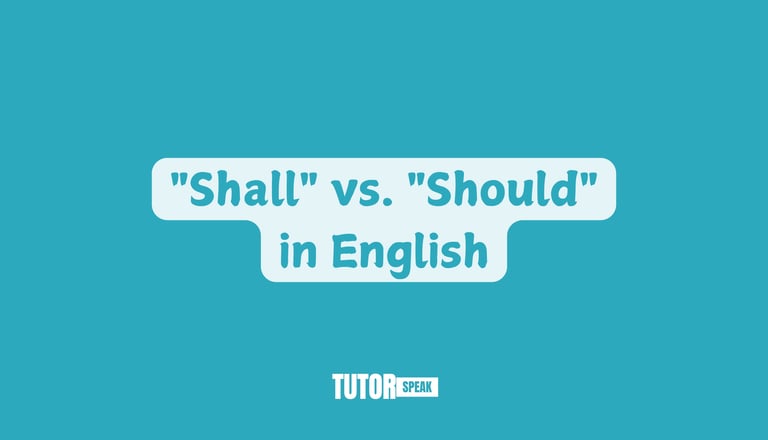Shall vs. Should in English
In English, shall and should are both modal verbs used to express different meanings. Understanding when to use each of these verbs can improve the accuracy of your English communication. Let's explore their uses and differences.
TutorSpeak
12/17/20243 min read


Shall vs. Should in English
In English, shall and should are both modal verbs used to express different meanings. Understanding when to use each of these verbs can improve the accuracy of your English communication. Let's explore their uses and differences.
Shall
1. Formal Future Action
Traditionally, "shall" is used to express a future action, especially in more formal or old-fashioned language. It is often used with "I" and "we" to suggest what will happen.
Example: "I shall go to the store later."
Example: "We shall arrive at 6 PM."
2. Offers and Suggestions
"Shall" is commonly used for making offers or suggestions, especially in a polite or formal context.
Example: "Shall we go to the movies tonight?"
Example: "Shall I help you with that?"
3. Legal or Binding Language
In legal contexts, "shall" is often used to indicate something that is mandatory or a requirement.
Example: "The contractor shall complete the work within three weeks."
Should
1. Advice or Recommendations
"Should" is frequently used to give advice or make recommendations, implying that something is the right or expected course of action.
Example: "You should study for the exam."
Example: "She should eat more vegetables."
2. Expectations
"Should" is used to express expectations, something that is likely to happen or is generally assumed.
Example: "He should be here by now."
Example: "The train should arrive at 7:30 PM."
3. Obligation or Duty
"Should" can express obligation or a sense of duty, although it is less forceful than "must."
Example: "You should apologize for what you said."
Example: "People should respect the rules."
4. Hypothetical Situations
"Should" can be used in conditional or hypothetical situations, often implying what is expected in a particular condition.
Example: "If you should need help, feel free to ask."
Example: "Should it rain tomorrow, the event will be canceled."
Key Differences:
Shall is more formal, used for future actions (mainly with "I" and "we") and making suggestions or offers.
Should is used for giving advice, expressing expectations, obligations, or hypothetical situations.
Summary: Shall vs. Should
Shall is more formal and used primarily in the following contexts:
Future Actions: Mostly used with "I" and "we" for future events.
Example: "I shall go to the store."
Offers and Suggestions: Used for polite offers and suggestions.
Example: "Shall we go to the park?"
Legal or Binding Language: Often used to indicate obligations or requirements in formal contexts.
Example: "The contract shall be signed by both parties."
Should is used to:
Give Advice or Recommendations: Implies what is right or expected.
Example: "You should eat healthier."
Express Expectations: What is likely or expected to happen.
Example: "He should be home by now."
Show Obligation or Duty: Suggests what is the right thing to do, less forceful than "must."
Example: "You should apologize."
Hypothetical Situations: Used in conditional contexts.
Example: "Should you need help, just call."
Exercises
Exercise 1: Choose between "shall" and "should" to complete the sentences.
_______ we go for a walk after dinner?
You _______ finish your homework before you go out.
I _______ attend the meeting tomorrow.
If you _______ need anything, just let me know.
She _______ speak more clearly during the presentation.
_______ I help you with your bags?
Exercise 2: Fill in the blanks with "shall" or "should" based on the context.
We _______ leave for the airport at 8 AM.
You _______ try the new restaurant; the food is amazing.
If you _______ need assistance, don’t hesitate to ask.
The manager _______ provide feedback on your performance.
I _______ visit my grandmother this weekend.
We _______ hurry up if we want to catch the train.
Exercise 3: Correct the sentences if needed.
I shall go to the park tomorrow.
She should to finish her assignment before the deadline.
Shall you be able to come to the party next weekend?
We should call him if we need any help.
He shall be happy to assist you with the task.



